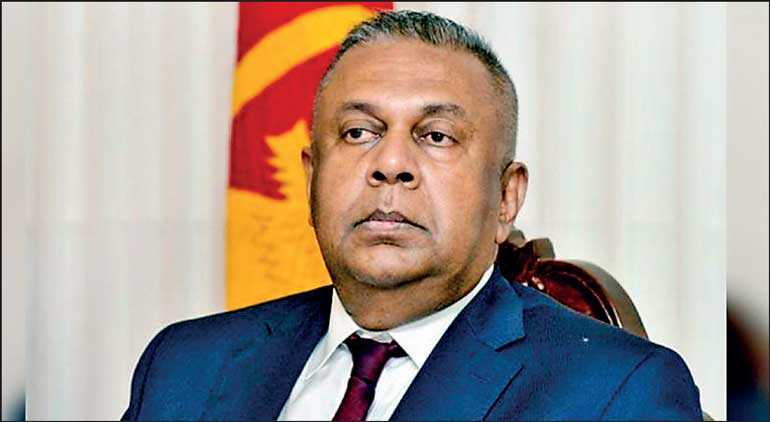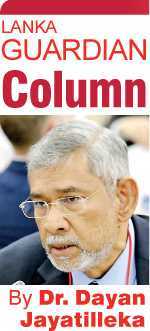Thursday Feb 19, 2026
Thursday Feb 19, 2026
Monday, 5 April 2021 00:00 - - {{hitsCtrl.values.hits}}

Former Foreign Minister Mangala Samaraweera
 In his recent media briefing, former Foreign Minister Mangala Samaraweera makes two important points.
In his recent media briefing, former Foreign Minister Mangala Samaraweera makes two important points.
Firstly, that the 2015 UNHRC Resolution was actually drafted by Sri Lanka—chiefly by the then Prime Minister Ranil Wickremesinghe—and not just co-sponsored by it. To the contrary, it was apparently the other states that co-sponsored Sri Lanka’s resolution at Colombo’s invitation.
Secondly, that the 2015 resolution was one of the ‘golden moments’ of Sri Lankan foreign policy.
In Mr. Samaraweera’s words:
“So, we said, give us a little more time until September where we will present our resolution for a national independent judicial mechanism and the Prime Minister along with a group of top-level experts drafted this resolution and then we invited the US Ambassador and UK High Commissioner to co-sponsor this resolution. This whole idea that we sponsored a foreign resolution is an utterly misleading lie. We managed to get the powerful countries to back us and each and every word in that resolution was approved by President Sirisena…”
If we take him at his word, the PM at the time, Mr. Ranil Wickremesinghe, and the Foreign Minister Mr. Samaraweera himself are fully responsible for “affirming the importance of participation in a Sri Lankan judicial mechanism, including the special counsel’s office, of Commonwealth and other foreign judges, defence lawyers and authorised prosecutors and investigators”. (OP6, Resolution 30/1, 2015)
Mr. Samaraweera’s proud assertion that “the Prime Minister along with a group of top-level experts drafted this resolution and then we invited the US Ambassador and UK High Commissioner to co-sponsor this resolution” leaves open two questions:
1. Did that “group of top-level experts” include anyone with remotely the stellar level of credentialed expertise that the Paranagama Commission mustered as co-authors of its Report: two former chief prosecutors of international war crimes tribunals (including Sir Desmond de Silva QC) appointed by the Secretary General of the UN, and a General who commanded the British SAS? If not, why didn’t the PM and Minister Samaraweera present the Paranagama report in Geneva in 2015 and pledge its implementation?
2. Why did the PM’s invitation to co-sponsor the Resolution, limit itself to “the US Ambassador and the UK High Commissioner” and not include Asia, e.g., India, Japan, and China?
In March 2021 UN High Commissioner for Human Rights Michelle Bachelet reminded the world that: “The report of the OHCHR investigation on Sri Lanka (OISL), released in September 2015, found credible evidence that both Sri Lankan security forces and LTTE were responsible for war crimes and crimes against humanity.” The 2015 Resolution drafted by the (then) PM Ranil Wickremesinghe and his “top-level experts” “appreciated its findings and conclusions” which allege that “system crimes” (OP1, Resolution 30/1, 2015).
Some ‘golden moment’, that
The thoroughly confused former Foreign Minister, mistaking the 2014 UNHRC Resolution 25/1 for the 2009 UNHRC Resolution S-11/L1, claims that Sri Lanka undertook “a comprehensive investigation into the alleged serious violations and abuses of human rights and related crimes by both parties”. Absolutely nothing of the sort was included in the 2009 Resolution.
He compounds his confusion by claiming that in 2009 “Sri Lanka very hurriedly presented a resolution to the UNHRC, the 25/1 resolution of May 2009”.
Mr. Samaraweera’s hallucinations notwithstanding, Sri Lanka did not, “within four days of Mr. Ban Ki-Moon’s arrival…hurriedly prepare a resolution to present to the Council”. As Foreign Minister he should have known our diplomatic history.
The UK House of Commons Research Briefing Paper dated 5 June 2009, makes things clear:
“On 18 May 2009 the EU called for an independent war crimes inquiry. The US has added its voice in support of these calls. However, at a special session of the Human Rights Council on Sri Lanka which took place on 26-27 May, Western attempts to include such a call in the final resolution were comfortably defeated by Sri Lanka and its allies…”
– ‘War and Peace in Sri Lanka’, Commons Briefing Papers RP09-51, John Lunn, Claire Mills, Ian Townsend, 5 June 2009 (https://researchbriefings.parliament.uk/ResearchBriefing/Summary/RP09-51#fullreport).
Singapore’s Ambassador/PR to the UN-Geneva in 2009 wrote in an authoritative volume:
“…Behind this apparent move, some saw a cynical last-ditch attempt by an effective pro-Tiger lobby in many Western countries to pressure Sri Lanka to desist from finishing the Tigers. In the end, Sri Lanka won the understanding of a majority of member states in both the HRC and the wider UN membership…”
— Tan York Chor, ‘50 Years of Singapore and the United Nations’ eds Tommy Koh et al, pp. 74-75.
Mangala waxes lyrical about 2015:
“…Sri Lanka got the friendship and the support of the whole world. In fact, when our joint resolution was presented in Geneva in September, not one country opposed it. Now this time when an investigation was initiated in Geneva, Pakistan and China got up and opposed that. However, all power blocs supported us in 2015. We had the support of the USA, the European Union, the UK, Japan, India and most of all China and Russia. Forgive me for saying so but I believe this was one of the golden moments in the history of foreign policy in this country. Whatever anyone says, I will challenge them anywhere to argue that this was actually a golden moment where we stuck to our words carrying out a balanced foreign policy which all countries appreciated.”
Here’s the reality regarding Mr. Samaraweera’s grotesquely absurd claims:
The US, UK or EU?
Every time the UNP fared disastrously at elections, colossal foreign policy blunders were a factor. Mr. Samaraweera may designate them “golden moments in foreign policy”.
When a ‘golden moment’ in foreign policy is a factor in the destruction of an old democratic political party (the UNP), the dreadful diminution of another (the SLFP), and the victorious eruption of autocratic ultra-nationalism, who and what is it a ‘golden moment’ for, apart from the militarist Far Right?